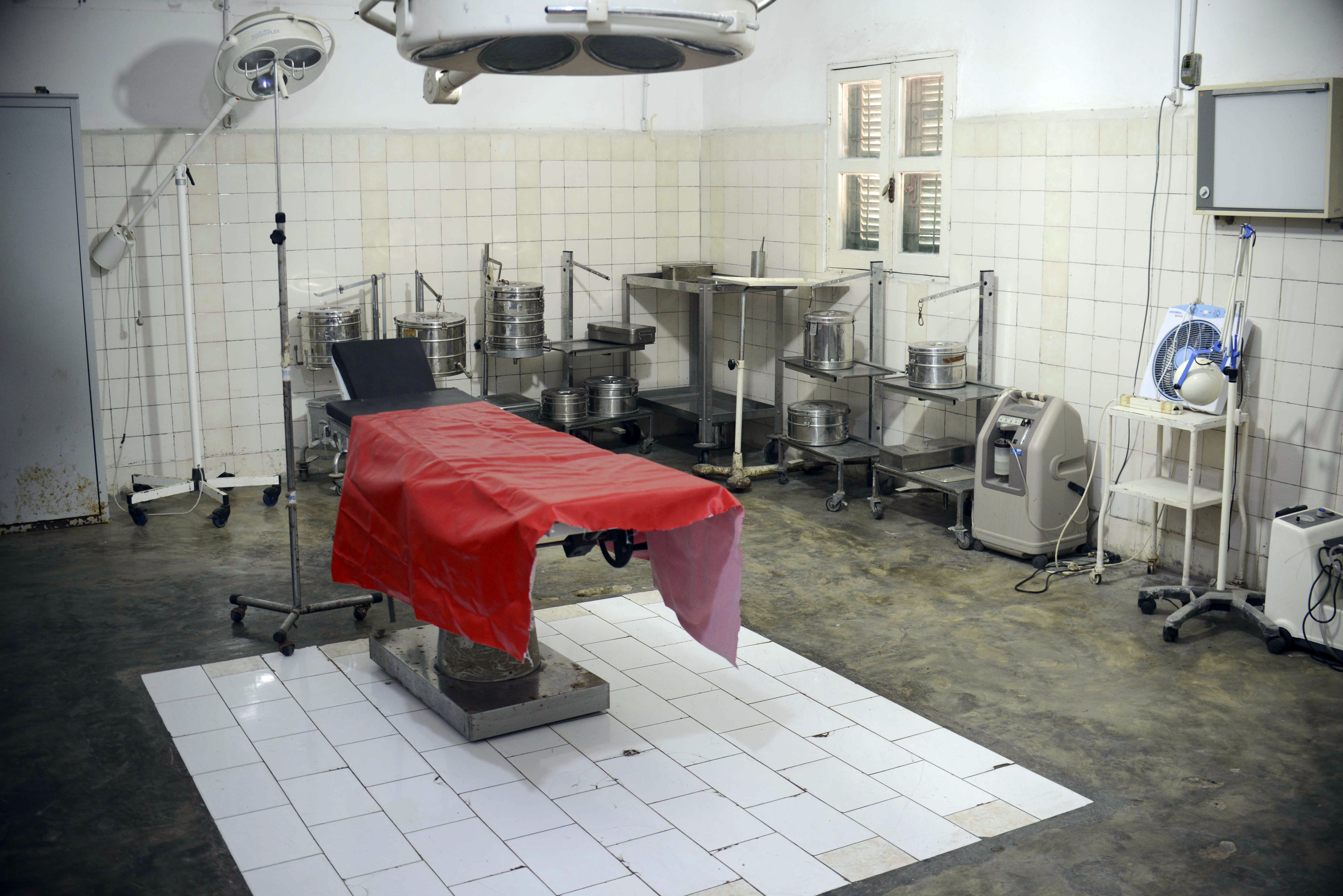
Researchers tackle obstacles to medical aid

Two-thirds of the world’s population have no access to diagnostic imaging, but a Swiss project is working to produce a radiology machine that is cheap, robust, easy to use and able to handle rough conditions.
Medical devices sent to developing countries are often unsuitable or just don’t work. To help overcome this, the EssentialTech programme, an initiative of Lausanne’s Federal Institute of Technology (EPFL), is promoting technologies that contribute to reducing poverty.
“It’s not about patching together cheap versions of devices that already exist. We have to reinvent everything, starting with a blank sheet,” Klaus Schönenberger, head of the EssentialTech programme told swissinfo.ch.
Schönenberger, who has a background in medical appliances, experienced a revelation in 2009 while reading the annual report of one of the sector giants, “whose sales in developing countries were practically nil”.
Along with Bertrand Klaiber, an electronics engineer with 15 years’ marketing and strategy experience, and Beat Stoll, a doctor and public health specialist familiar with the conditions in sub-Saharan Africa, he created the EssentialMed foundation that now collaborates with EssentialTech.
EssentialMed is a non-profit organisation whose goal is to develop high-quality, affordable medical devices adapted to the needs of district hospitals in resource-poor regions.
According to the World Health Organization (WHO), more than 70 per cent of the latest appliances sent to African hospitals are not used. The overly sophisticated machines soon break down due to intense use, heat, humidity, dust, irregular electric supply as well as lack of maintenance and know-how.
The first product in the EssentialTech pipeline is a medical imagery device that combines x-ray and ultrasound technology, which will be able to cover 90 per cent of a typical district hospital’s needs.

More
Developing nations are no second-hand market
A groundswell
“In order to work an x-ray tube needs 125,000 volts [units for electrical tension] and the same power as 120 television sets,” Klaiber explained. “When the electrical grid is weak or faulty, you have to rely on a system that will store the power to be released at the time of use.”
The latest technology lithium batteries are not an option, because they are expensive, difficult to recycle and flammable over 65 degrees Celsius.
This is just the kind of challenge that forces scientists to find alternatives to existing solutions. Their machine could only work with a serious dose of innovation, like the $100 computer launched in 2007 by the One Laptop Per Child initiative.
Its success was “a shock to the system”. With its hand-operated charger and screen that remains readable even under a tropical sun, this machine is often cited as an example by Klaiber and Schönenberger.
The founders of EssentialMed are far from alone in their push for “frugal innovation”. And they believe that, driven by the recession in developed economies, industries will seek growth in developing and emerging countries.
From trauma (accidents, bone problems) to chronic illnesses, especially tuberculosis, diagnostic radiology needs are growing in developing countries, according to Annick Antierens of Médecins sans Frontières (MSF) in Geneva.
On the ground, MSF teams are faced with a “dramatic” situation, where x-ray machines either lacking or not working. One improvement however, has been the replacement of film with digital images, which last better in hot and humid conditions and don’t require special materials.
Antierens welcomes any effort to reduce the cost of imagery devices, simplify them and make them less vulnerable to insufficient electricity supply.
However, she pointed out, while radiology is important, it is by no means everything.
Against the current
This new approach goes against the prevailing industrial philosophy. Unlike smartphones or televisions, the machines produced under the EssentialTech label will be built to last.
“In the 1960s appliances were robust,” Klaiber noted. “But afterwards, marketing dictated a model of technology which is no longer repaired but easily replaceable.”
“Our type of innovation not only rethinks the conception of the products but also the logistics, design and maintenance as well as the whole commercial model.”
The two researchers are thrilled to be working with an institution like EPFL, which plans to extend the concept to other technological domains.
“We are enjoying the academic freedom,” Schönenberger said. “It means we don’t have a marketing specialist who tells us how to target our resources for a fast financial return. We can have a medium or long-term vision and that’s very important in this domain.”
Since its initial conception in 2009, their medical imaging device (GlobalDiagnostiX) has already led to several innovative ideas, notably related to the crucial problems of electrical supply that are now “practically resolved”.
In Switzerland, more than 20 engineers are working with the EPFL team to design the first prototype. The two researchers and their partners are optimistic that they can present it within two years.
The EPFL’s Cooperation & Development Center (CODEV), with several decades’ cooperation experience behind it, is the initiator of:
EssentialTech, a programme “that aims to foster the development and implementation of essential technologies which can significantly contribute to the achievement of the Millennium Development Goals for poverty reduction”.
The EssentialMed Foundation, established by Schönenberger, Klaiber and Stoll in 2009, aims to develop and deploy effective, high-quality and affordable medical device, adapted to the needs of the poor communities of the world. Projects are currently being developed under the EssentialTech banner.
The partners of EssentialTech include EPFL, the Universities of Applied Sciences in Yverdon and Sion, the Paul Scherrer Institute (PSI) , the Tropical and Public Health Institute in Basel, University of Geneva, the university hospitals of Geneva and Lausanne, the engineering school of the University of Yaoundé in Cameroon, and the Swiss radiology diagnostic device manufacturer Betschart.
The first project is to develop a digital radiography machine (GlobalDiagnostiX), including an ultrasound imaging module, that costs less than $50,000 (CHF47,000) over ten years, around one tenth of the cost of existing solutions. Engineers are also working on an incubator for newborns, and looking into developing modules that could stabilise electricity supply in hospitals.
Social entrepreneurship
The machine will be highly innovative, but not all the ideas will come from Switzerland.
“We cannot figure out what developing nations need sitting in our offices in Lausanne,” Schönenberger said.
“It is vital to involve researchers from these countries in our work . No-one knows their needs better than they do. And in Africa, innovation is blossoming everywhere. Even in the slums, people forced to get by can have excellent ideas, some of which have been adopted by rich countries.”
EssentialTech has developed a two-pronged approach. It has set up a joint laboratory in Cameroon with the engineering school at the University of Yaoundé and at the same time sends students and researchers to the countries for which the new machines are being designed.
The aim is to precisely identify the on-site needs, immerse themselves in the context and get new ideas. Exchanges such as these have already taken place with Cameroon, Tanzania, Laos and Vietnam.
“Too often we have the tendency to treat the people of the developing world like sub-contractors or guinea pigs. Here they are really our partners in the whole process from innovation to deployment,” Klaiber added.
The two researchers don’t see their initiative as humanitarian work though. “It’s more social entrepreneurship. Working on these projects, you realise that cooperation and development is not only the preserve of sociologists and doctors.”
(Adapted from French by Clare O’Dea)

In compliance with the JTI standards
More: SWI swissinfo.ch certified by the Journalism Trust Initiative
















![The four-metre-long painting "Sonntag der Bergbauern" [Sunday of the Mountain Farmers, 1923-24/26] had to be removed by a crane from the German Chancellery in Berlin for the exhibition in Bern.](https://www.swissinfo.ch/content/wp-content/uploads/sites/13/2025/12/01_Pressebild_KirchnerxKirchner.jpg?ver=a45b19f3)











You can find an overview of ongoing debates with our journalists here . Please join us!
If you want to start a conversation about a topic raised in this article or want to report factual errors, email us at english@swissinfo.ch.